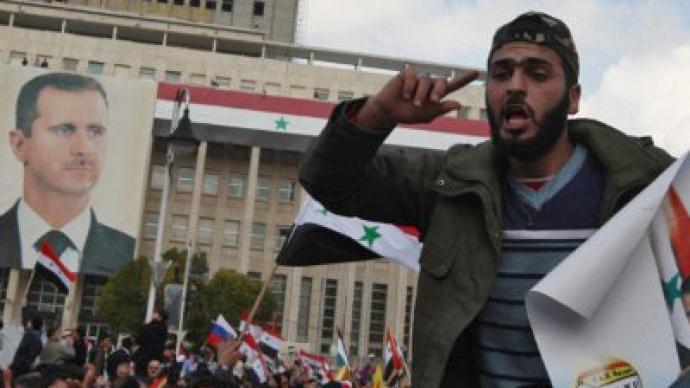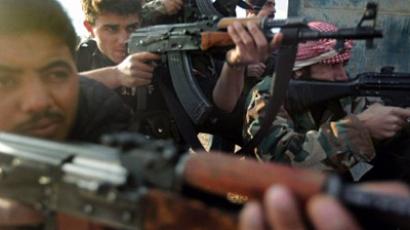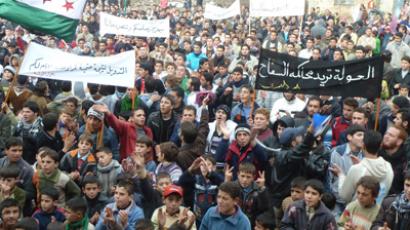Syria: Watch the weather forecast

Ankhar Kochneva, writer and sole foreign journalist permanently living in Syria, tells RT what is really up in the country, who funds the opposition, how international media fake images of unrest and why it is so important to watch weather forecasts.
RT: You have lived in Syria since October 2011. Media reports tell us about unrest in the country. How does the situation look from within? AK: Life is absolutely normal in an absolute majority of communities across the country, although some news agencies deliberately picture the situation as its exact opposite. Israeli media outlets catering to Russian-speaking audience are among the most active in this regard. For example, in reporting on a terrorist incident it is sometimes enough to lie about its exact location to have the world convinced that there is no peace in Syria. I am referring to an explosion that went off on the outskirts of Damascus on January 6th this year. Although the explosive device actually went off under a bridge, news reports could make you think the whole of downtown Damascus was reduced to debris. I hosted a group of tourists here for New Year. Some of them actually came for as long as 17 days. We rode across the country and did a lot of walking around Damascus. My guests saw a lot of smiling people in the streets. We sat in restaurants with some nice music, we went to a local street market, and they had a great time. They realized there is no war going on in Syria. RT: There is no war, but there are explosions. So who is planting the bombs? And where is the opposition headquarters located? AK: What makes Syria peculiar is that the so-called unpatriotic opposition here has no center, no leaders, no agenda and no specific premises. Nor do they have the numbers to create disturbances in multiple locations at a time. Most often there is unrest in a specific neighborhood, while other areas are calm. The people behind the explosions are the same people who shoot at passing vehicles, plant IEDs targeting oil pipelines and attack random targets with grenade launchers. There have been six terrorist attacks targeting railway tracks. A female student dormitory in Homs was recently assaulted with grenade launchers. Many of its inhabitants are girls coming from rural communities and low-income families, because rich families rent apartments for their girls. The perpetrators are the same people who kidnap civilians and demand ransom, and once they get the money, they return the abductee sliced into pieces. There have already been a hundred incidents of the kind. Some of the culprits who have been arrested are regular criminals, but there are also people who come to Syria from Iraq, Afghanistan or Libya. There are also young men coming from Dagestan, who are often ignorant about the actual situation in Syria and are therefore easily misled. They are agitated with tales of injustice into doing things that really are unjust. RT: Why would Al Jazeera and Al Arabiya disseminate all these falsified reports on Syria? AK: These TV networks have been employed as propaganda tools serving to destroy Syria as a state. Some of those propaganda tactics are stunningly elaborate, and you can only tell a lie if you live in Syria and focus on details. For instance, there has been a fantastic weather forecast for Syria broadcast on TV, where temperature indices actually stand for the time when protesters will assemble in a specific location to provoke unrest. If you are with the opposition, this broadcast tells you that there will be a rally in Homs tomorrow at 12pm, and specially instructed camera crews will be waiting for you and your associates to turn up to act as the angry masses. You spend five minutes yelling “Down with Assad” in a square and leave with hard cash in your pocket, and the world gets TV images of “a street revolution rocking Syria.” I witnessed this technique in action once. Al Jazeera reported on a street protest erupting near the Russian Cultural Center in Damascus in December 2011. I happen to live nearby, and I can see the Center from my window. There was nothing happening at this location at the time of the report. But exactly two hours later, a bunch of people turned up and launched an aggressive protest action. So it was not really a news report – it was coded instructions communicating the time and place of a staged disturbance. Similar tactics was used to announce the assault against the Syrian embassy in Amman early in December 2011. What these TV networks do is not reporting: they dispatch instructions for people to rally, stage riots and assault specific individuals. It is almost a competition for deliberately misreporting on Syria, where the perpetrators do not even bother to coordinate their propaganda activities. For example, when reporting the casualties for a specific day of unrest, Al Jazeera and Al Arabiya claimed diverging numbers. If they had been citing a particular source, such as the notorious Mr. Rami, who is based in London, then their figures would have matched. But they vary, which means the news people simply make them up. They do not even care if it looks plausible or not. RT: An Arab League observer mission has spent a month monitoring the situation in Syria. What have they come up with? AK: The Arab League mission comprised about 160 observers. The Syrians did not believe that these people were coming with good intentions. And their skepticism turned out to be legitimate from the very start. For one thing, the observers refused to inspect the site of the terrorist attack launched on December 24th. But as time went by and reports from Syrian civilians targeted by the criminals piled up, the observer mission experienced a radical shift in perception. At first, they went around stony-faced and declined to comment on anything, but later on they turned into normal individuals with a heart for the locals. This delegation is accompanied by a camera crew that follows them everywhere and runs chronicles of their monitoring activities on Syrian TV. When you meet several hundred people every day asking you to do the right thing and report the truth, anyone with a glimpse of decency in their heart will not be able to go on lying. This is exactly why many of the people in the Arab League who had initially contemplated this observer mission were very unhappy with its eventual findings. They suggest swapping individual observers, then they prolong the mission for one more month, as if extra time will help them find the fictional “atrocities of the regime” in Syria – at least, that is how things stand on January 25.RT: Are you saying the regime has not committed any atrocities whatsoever? AK: I personally have not heard of anything I would find plausible. Either we are shown footage of people from other countries dressed as the Syrian army, or we see people in uniform wearing white flip-flops, or alleged Syrian military with beards, which are banned by the Syrian army’s grooming standard. However, Syria has general conscription, which means there might be people in the army who have friends or relatives among the insurgents, so they might assist them in smearing the military. RT: Some people within the Islamic community accuse President Bashar al-Assad of killing a total of 300 children. What are they talking about? AK: In the instances that I know of, it was criminals and not the military who actually murdered children. For example, when someone asked Saria, the mother of a murdered Christian boy, whether Al Jazeera was right in claiming it was the army who killed her son, she replied that if the army had been in town at the time, her son would not have been killed. In another case, international media passed a juvenile rapist killed in Daraa for a victim of the regime, whereas in reality he had been executed by the father of one of his victims. President Assad personally came to Daraa to investigate the incident and eventually decided not to disclose the actual facts so as not to compromise the girl who had been raped. But after the international media peddled the story of “a boy killed by the Syrian army,” the authorities had to expose the actual crime. There was another characteristic example, when an internet banner was passed around social networks depicting the sons and the nephew of a Syrian colonel who had been murdered by criminals in Homs on 19 March 2011. Everyone in Syria is aware of the true circumstances of the murder, but for the international public, that banner was compelling as evidence against the Syrian government. I know a reporter who was once abducted by criminals and brought to a secret location, where he was presented with the body of a murdered child. The kidnappers forced him at gunpoint to record a video saying he had personally witnessed the military killing that boy. The journalist was told they would kill him too if he ever told the truth about the incident. He sat on the true story for several days out of fear, but eventually he exposed it for his own TV network. This reporter is a Syrian working for the Lebanese Al-Manar TV station. A lot of well-meaning and trusting people in other countries fall for such deliberate lies. Some of them earnestly believe that they are supporting justice by passing around these stories about 300 children killed by the army, so they do their best to destabilize the situation and undermine the regime. But in reality, all they do is promote bloodshed and harm their own kinsmen. Even their donations serve the wrong purpose. RT: The opposition has no center and ringleaders, but there are endowments and donations. Who is entrusted with handling the money? AK: Criminals apprehended by the military admit having been paid for their actions. The payment is always in cash. Sometimes it is US dollars, sometimes it is Syrian pounds. They also admit being supplied with weapons, ammunition, grenades, launchers and explosives. Some of the grenades used by the opposition are labeled as made in Israel, by the way. We do not claim that Israel directly arms the opposition, but the fact is that they get their weapons abroad. The Syrian army does not have any Israeli-made arms, just as it does not have weapons made in the United States or in Europe, the kind that have been confiscated from captured insurgents. The insurgents also make money by kidnapping people for ransom. The captured criminals have named the specific people who had been paying them to abduct people, as well as the exact prices. A kidnapper is paid a share of the ransom that equals about $200. That is a lot of money in Syria. RT: What is known of the endowments that finance the opposition? AK: I was once invited to meet a woman in Moscow, who heads one of these organizations. Her name is Stephanie Brancaforte, and she is a Campaign Director for an international association called Avaaz. They have a website located at http://avaaz.org/en/about.php This organization has recently taken interest in meeting with bloggers who regularly report on Syria and tell the truth. They found our contacts and proposed a personal introduction, and the head of the endowment specially came to Moscow to meet us. I guess we must be really important for them. Since I permanently reside in Syria, that woman quickly realized that I would not be duped, nor would I sell out to them. That lady has never been to Syria herself, she does not speak Arabic, and she draws her opinions on the situation in the country from other people’s reports. Nonetheless, she is extremely categorical in her assessment of what is going on there. When I asked her straightforward whether she had ever visited Syria, she ended our meeting abruptly. Notably, she had learnt about me from Syrian opposition members based in Moscow. That means they maintain contact with each other. Nobody will ever convince me that an organization that explicitly admits to financing the opposition within Syria does not sponsor opposition members who live in Moscow. RT: Is Bashar al-Assad hiding right now? AK: There was a demonstration in Damascus recently to manifest the citizens’ solidarity with the government. It was not the largest among such rallies, in fact. Bashar al-Assad showed up together with his wife and children and delivered a public address. I personally saw people running ecstatically to the square to hear him speak and show their support.
Nadezhda Kevorkova, RT














